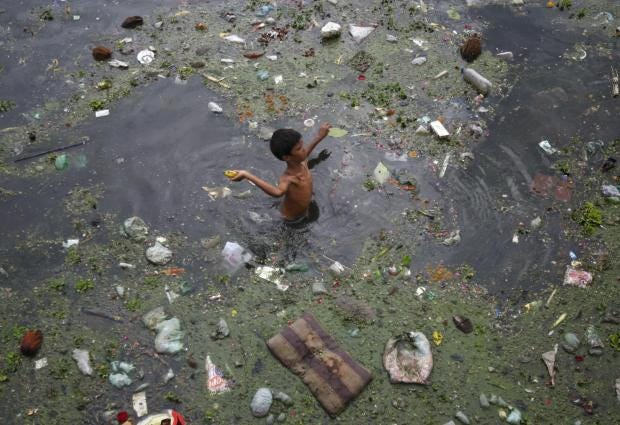http://www.independent.co.uk/environment/world-water-day-united-nations-un-wastewater-sewage-finite-fresh-disease-energy-electricity-stefan-a7635006.html
Stop wasting sewage to save 'finite' supplies of fresh water, warns UN
Exclusive: Speaking to The Independent ahead of World Water Day, top United Nations' official says people must realise wastewater can be a valuable source of nutrients, energy and even titanium
- Ian Johnston Environment Correspondent
- @montaukian
- 24 comments
|
|
|
|
Click to follow
The Independent Online
The Independent Online

The United Nations is to issue a call for the world to stop simply throwing sewage away, arguing that it is economically valuable and warning that fresh water is a finite resource.
More than 80 per cent of the world’s wastewater is currently discharged into the environment untreated, causing diseases that kill 842,000 people every year, including about 300,000 children under the age of five.
Blooms of algae, which grow rapidly in sewage-rich sea water, have also created vast ‘dead zones’ where most marine life cannot survive. And fewer fish in the sea means less food for humans at a time when the global population is climbing rapidly.
READ MORE
But, in an interview with The Independent ahead of World Water Day on 22 March, Professor Stefan Uhlenbrook, director of the UN World Water Assessment Programme, said there was already a solution to many of the problems caused by human sewage.
And that was to recognise its inherent value as a source of water — after treatment — but also nutrients, energy and even valuable materials such as titanium.
“If you look at the whole globe, the fresh-water resources are finite…The problem is we are polluting the fresh water more and more, so the unpolluted water becomes less and less,” Professor Uhlenbrook said.
“Every year wastewater has been increasing and it is very, very likely to increase in the future.
“Often wastewater is seen as a burden, something to be disposed of, a nuisance to be ignored. We too little see it as a resource.
“That needs to change. Poo and pee can work for us.”
This message will be a central theme of a report due to be published by the UN as part of World Water Day.
Apart from during severe droughts, it is unlikely that humans will run out of water to drink. But, for 1.8 billion people on the planet, that water is contaminated with faeces, putting them at risk of potentially deadly diseases such as cholera, dysentery, typhoid and polio.
“In 2012, 300,000 children under five died because of poor hygiene and poor sanitation,” Professor Uhlenbrook said.
“That is the equivalent of three large airplanes full of children crashing every day — just because of poor hygiene, poor sanitation. That’s a very drastic one for children.
“If you look at the increase in life expectancy over the last 130 years, any doctor will say it’s largely been because of better toilets, better sanitation and keeping away from the pathogens.
“Better sanitation is really making a critical difference. It’s not only the better cancer treatment and all this expensive stuff.”
Sewage often ends up being dumped untreated into the sea, which can seem like the cheapest option.
But there is a cost — not one paid by those responsible with disposing of sewage, but rather by the fishing industry in lost catches.
Algal blooms caused by too much human fertiliser can have a devastating effect on the sea as the oxygen in used up, causing fish and most marine life to asphyxiate.
“Globally, 250,000 kilometres squared, roughly the size of Great Britain, of the marine ecosystem is severely impacted by that,” Professor Uhlenbrook said.
“That has implications for the environment but also…it’s not supplying the food we need from the sea. It has social and economic implications.”
However, in a message reminiscent of the saying “where there’s muck, there’s brass”, the UN is now urging the world to stop wasting wastewater and start exploiting its not inconsiderable value.
In pictures: Plastic pollution around the world
Perhaps its biggest use is as fertiliser for crops, after it has been treated to remove dangerous bugs.
The water itself, particularly in arid countries and large cities, can be treated for reuse domestically and by businesses.
Industrial wastewater can also contain valuable rare earth minerals that can be recovered on an economically viable scale.
And sewage, like any kind of organic material, is a good source of energy.
Treatment plants can extract methane from it, then use this as a source of fuel or to make electricity as Professor Uhlenbrook explained.
“We have already in the Netherlands and some other countries, energy-positive wastewater treatment plants,” he said.
“Usually you need energy to pump the water, to do certain treatment processes. This [plant] uses the organic material, puts that in a digester to make methane and that methane is burnt as an energy source.
“This not only supports all the processes in the wastewater plant, but also they can export energy.
“The wastewater treatment plant becomes a little power house.
“Technologically it’s already possible. We are not talking about something for the next 10 years.”
All these sources of income can help make a business case — on top of the arguments around human health and the environment — to start treating some of that 80 per cent of wastewater which is currently being dumped.
“If you want to collect and treat wastewater at a plant, it will require some sort of capital investment,” Professor Uhlenbrook said.
“If you look at the other revenue streams that can be generated from wastewater, it can really help to support that investment.”
To him, this is “a win-win situation” that the world must wake up to, particularly as “freshwater resources are becoming increasingly scarce”.
“There’s huge potential globally that could be utilised for the benefit of people, the environment and for the economic benefits,” he said.
“Water — and wastewater — is a central component of the global economy and should be considered much more, it should receive much more attention.”





沒有留言:
張貼留言